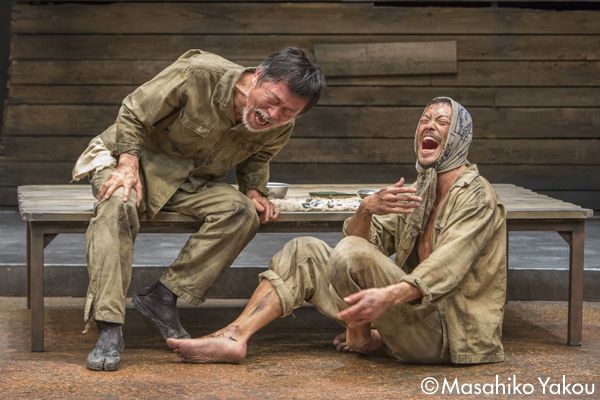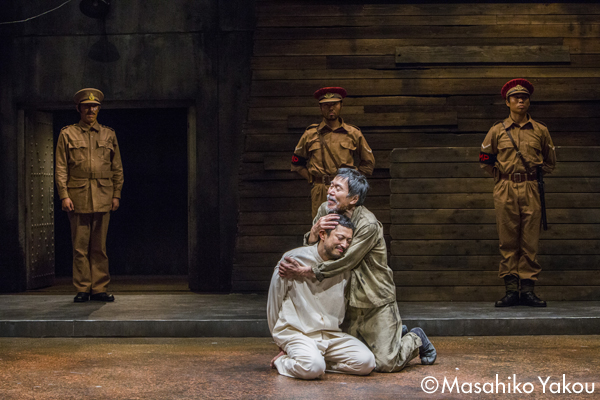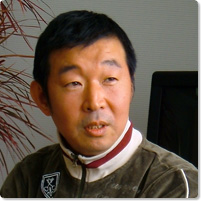A summer morning, 1947. Changi Prison, Hall P (cellblock holding inmates sentenced to death). A row of six solitary confinement cells, overhead the gallows can be seen. Brought out from the cells are Japanese soldiers Kuroda, Yamagata, Konishi, and civilian employees of the Korean military (not members who make up the army) Namson (Japanese name: Nansei) and Munpyon (Bunpei). Each of them has been convicted of torturing British prisoners of war and all have been sentenced to death.
Beneath the shining sun, Kuroda and Namson are playing a game of go, Munpyon is writing something on a piece of paper, Konishi is drawing a map on the wall of his cell of the Taimen Railway he was involved with (the railway the Japanese army began to build in June 1943, and finished the following October that connected Thailand and Burma, the present-day Myanmar). Of them, only Yamagata is deep in thought.
Namson, who once sought to become an actor, is pleased with himself as he occasionally quotes lines from “Macbeth” while playing go. The young crybaby Munpyon is being ill-treated by a guard, so there are always fresh wounds on him. Munpyon complains to his mother in a letter of the agony of being made a war criminal. Namson criticizes Munpyon saying, “Who are you going to make happy by writing that?” Just then, Chungil (Harukichi), who had been released, is brought back. He was arrested in Hong Kong as he was being repatriated and sentenced to death again. Chungil becomes enraged that he was not able to defend himself against his former superior officer Yamagata. All of the abuse of prisoners was under orders from Yamagata. He claimed he was innocent, but his pleas fell on deaf ears.
As Chungil’s hatred of Yamagata grows, he denounces Yamagata’s violent behavior as the reason his close friend Tonhan committed suicide. But Yamagata remains silent. Konishi is illiterate, so he asks Yamagata to write a letter to his wife for him. Konishi’s feelings for his wife at some point overlap with Yamagata’s for his family, which thus turns it into a monologue by Yamagata.
Evening approaches. Namson says he received a letter from his younger sister living in his hometown. The letter says his father has petitioned the British Consulate General to work for his clemency. His fellow prison comrades look perplexed at Namson for being in high spirits. Chungil attacks Yamagata with a toothbrush whittled down to a sharp point. Yamagata screams at him, “Kill me, this is already hell,” but in the end Chungil is not able to stab him. In spite of the fact he is Korean, there was nothing else to do but mourn the absurdity of being sentenced to death as a Japanese war criminal.
The head guard Narayanan enters and announces executions will be carried out the following morning. He reads out the names: Namson, Yamagata, Konishi. Namson runs after the guard, “My clemency petition is going to arrive,” but the guard knocks him down. Namson is moaning, “I want to live.”
Nighttime, there is a special last meal for the three men scheduled for execution. To liven up the occasion, Namson and Kuroda perform “Macbeth.” During the entertainment Namson comes to understand why Macbeth killed the king. “Macbeth chose his own ruin.” Then, Namson realizes that the reason he will be executed as a war criminal is the result of choices he himself had also made. He realizes that dispatching prisoners of war in order to promote construction of the railway was in effect, the equivalent of killing those British prisoners.
Almost as if that confession had struck him, Kuroda begins to speak of the “crimes” he had committed in New Guinea. He shot a village mayor, the ringleader of an enemy guerilla band, and put an end to a young Korean soldier who was suffering from a bullet wound. Kuroda had killed not only those two, but along with them he confesses to killing thousands or tens of thousands of Asian people. He gets down on his knees and begs Namson, “Forgive me.” Yamagata watches what is happening with intense reproach.
All of their anger and despair mingle together, throwing them into an uproar. Namson speaks to Kuroda, “Regret this until you die. After you’re dead and we’re in the other world, I’ll forgive you. Humankind will mean nothing then.” Yamagata and Konishi, both of them angry at Kuroda, go inside their cells. Namson and the others begin to sing aloud as if to enjoy what remains of their lives.
The morning of the execution. Kuroda stops Namson as he walks to the gallows, hugging him tightly in place of his father. His voice quivering, Namson says, “Thank you, I really did love my father.” And then, he heads for the gallows with a smile on his face. Konishi goes half mad, screaming his innocence, but it’s nothing more than cries in vain. Yamagata seems to shake it all off, and with a refreshing smile on his face, goes to the railway map Konishi couldn’t finish drawing and fills in the name of the last station. He gives those remaining a bright salute and heads for the gallows.
The following morning, Kuroda is playing a solitary game of
go
and Munpyon is looking up at the sky. Chungil and the guard enter together; he tells them his sentence has been reduced to 20 years and is to move to another cell. Munpyon reveals that his mother took her own life due to the burden of her son being a war criminal. He entrusts Chungil with a letter that was to go to his mother, telling him that when he is released, he wants him to read it to someone. He says through his tears, “It gives me a little hope to think that at some time in the future someone will read the letter I have written, the day will come when someone will know how I feel.” Chungil promises to tell everyone about the miserable situation they’ve been in as long as he lives, and then leaves.
Only Kuroda and Munpyon are in the cellblock. A quiet rain falls on the two of them who have been left behind. In the gentle rain that continues to fall, the two are keenly aware of being alive.
Author’s note: Because the time frame for this work is before the establishment of the Republic of Korea in 1948, I avoided reference to “South Korea,” instead using “Koreans” to refer to people and “Korean” for the language.




